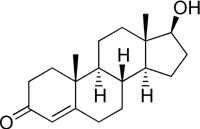Courtship Induction and Male Milking
(by Susanne Liu, M.D., for DreamLover Laboratories)
Testosterone, the molecule of desire
 While for several decades scientists have made
detailed studies of the psychology and anatomy of
sexual arousal itself, it is only within the last
few years that desire, the harbinger of arousal, has
become a focus for research. The new studies are focusing on
both the biological and the emotional chemistry of
desire.
While for several decades scientists have made
detailed studies of the psychology and anatomy of
sexual arousal itself, it is only within the last
few years that desire, the harbinger of arousal, has
become a focus for research. The new studies are focusing on
both the biological and the emotional chemistry of
desire.
"The purpose of Male Chastity is to enforce the non-ejaculatory period which yields to spontaneous initiation of courtship"
New research on the biochemistry
of desire, particularly the role of hormones,
especially testosterone. Testosterone is often
called the male sex hormone because it is more
prevalent in men, although it fluctuates in the
individual with time, and plays a key role in
development of masculine traits.
Recent studies show that one of its main
effects is on desire.
In a study of men who suffered from extremely low
levels of desire as the result of underactive
gonads, doses of testosterone increased the men's
frequency of sexual fantasies and boosted their
sexual desire.
This study and others with similar results have led
scientists to conclude that testosterone regulates
sexual desire. The new study, done by J.
Davidson, a physiologist, and colleagues at Stanford
University, was reported in "Patterns of Sexual
Arousal", published this year by Guilford Press.
Hormone's Role in Women
"It's now very clear that testosterone is the
biological substrate of desire, at least in men",
Dr. Davidson said.
Effects of ejaculation on testosterone levels
In the study "A research on the relationship between ejaculation and serum testosterone level in men" by Jiang Ming at Zhejiang University,
the serum testosterone concentrations of 28 volunteers were investigated daily during abstinence periods after ejaculation for two phases.
The authors found that the fluctuations of
testosterone levels from the 2nd to 5th day of
abstinence were minimal. On the 7th day of
abstinence, however, a clear peak of serum
testosterone appeared, reaching 145.7% of the
baseline (P<0.01). No regular fluctuation was
observed following continuous abstinence after the
peak. Ejaculation is the precondition and beginning
of the special periodic serum testosterone level
variations, which would not occur without
ejaculation. The results showed that ejaculation-
caused variations were characterized by a peak on
the 7th day of abstinence; and that the effective
time of an ejaculation is 7 days minimum. These data
are the first to document the phenomenon of the
periodic change in serum testosterone level; the
correlation between ejaculation and periodic change
in the serum testosterone level, and the pattern and
characteristics of the periodic change.
In "Nature of the Clearance of Exogenous Testosterone and Progesterone in Ejaculated Bovine Semen" by Hugo Eiler and Charles N. Graves, bovine
males received testosterone injections.
Within 20 minutes after the injection of
testosterone (100 mg Intravenously), plasma
concentration of androgen (mean +- SEM) was 698 +-
240 ng/ml (92% testosterone) and semen concentration
of androgen was 27.7 ng/ml (76% testosterone).
Within 20 minutes after the injection of
progesterone (100 mg intravenously), plasma
concentration of progestin was 2226 +- 635 ng/ml
(96% progesterone) and semen concentration of
progestin was 68.2 +- 2.2 ng/ml (68% progesterone).
Thereafter, the concentrations of androgens and
progestins in both plasma and semen steadily
declined. Semen/blood concentration ratio values for
progestins and androgens were similar to each other
during the experimental period. It was concluded
that testosterone and progesterone were readily
transferred to the ejaculate from the blood.
The study "Endocrine
response to masturbation-induced orgasm in healthy
men following a 3-week sexual abstinence" (World J Urol. 2001 Nov;19(5):377-82)
examined the effect of a 3-week period
of sexual abstinence on the neuroendocrine response
to masturbation-induced orgasm. Hormonal and
cardiovascular parameters were examined in ten
healthy adult men during sexual arousal and
masturbation-induced orgasm. Blood was drawn
continuously and cardiovascular parameters were
constantly monitored. This procedure was conducted
for each participant twice, both before and after a
3-week period of sexual abstinence. Plasma was
subsequently analysed for concentrations of
adrenaline, noradrenaline, cortisol, prolactin,
luteinizing hormone and testosterone concentrations.
Orgasm increased blood pressure, heart rate, plasma
catecholamines and prolactin. These effects were
observed both before and after sexual abstinence. In
contrast, although plasma testosterone was unaltered
by orgasm, higher testosterone concentrations were
observed following the period of abstinence. These
data demonstrate that acute abstinence does not
change the neuroendocrine response to orgasm but
does produce elevated levels of testosterone in
males.
Evidently then, ejaculation has a negative impact on a male's blood testosterone levels,
and abstinence greatly increases its concentration.
Testosterone and courtship
Experiments on a very wide variety of species have clearly identified testosterone as a
courtship inducer. Courtship can be defined as the "work" a male is willing to do in order to gain
the favor of a female; in this case, you. Therefore, induction of courtship has long been recognized as
an effective method of male training, increasing chores and work output, attention span, receptiveness, and
reducing training time.

Courtship is induced by raising a male's testosterone levels by 50% or more through a sustained non-ejaculatory period of
at least seven days.
|
|

